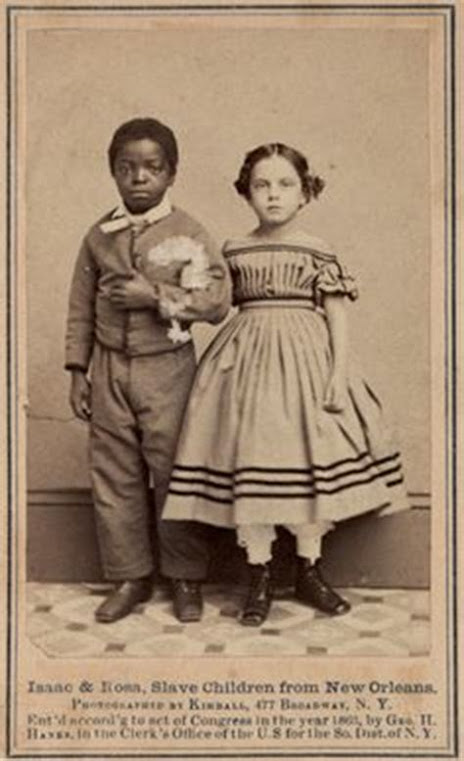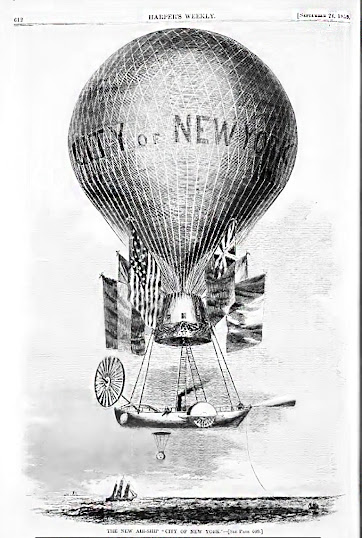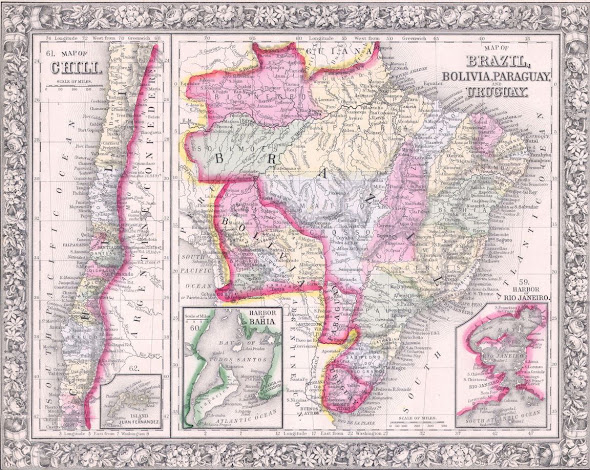Southern Attitudes on Slavery
Slave Holding in the South
Isaac & Rosa slave children from New Orleans
Disunion the Doom of Slavery
Hon, W.W. Boyce of South Carolina, in
1851, speaking of the hostile spirit of the age to the institution of slavery
said—“Secession, separate nationality with all its burdens, is no remedy. It is
no redress for the past; it is no security for the future. It is only a
magnificent sacrifice to the present, without any wise gaining in the future.
For various reasons I have stated, I object in strong terms as I can, to the
secession of South Carolina. Such is the intensity of my conviction on this
subject, that if secession should take place—of which I have no idea, for I
cannot believe in the existence of such a stupendous madness—I shall
consider the institution of slavery as doomed, and that the Great God, in our
blindness, has made us the instruments of its destruction.”
1863 Emancipated Slaves from New Orleans
Slave
owners favoring staying in the Union were a sizable minority. Slavery advocates
sometimes pointed out there was nothing to be gained by secession and much to
lose. As one young man wrote to the Raleigh, NC, Register in 1860, “With the
Fugitive Slave Act fellow citizens are legally obliged to help return our
runaway property and Dred Scott (Supreme Court Decision in early
1856) means we can take our property anywhere without fear of freeing
them. If we were a separate country these laws would no longer apply.”
Manumission
in Southern states was increasingly made a more complicated legal process. The
South feared that freeing slaves on one plantation would give slaves on
surrounding plantations the idea they should be freed as well. Slave uprisings
were the constant Southern nightmare, especially after Nat Turner’s Rebellion
in southeastern Virginia in 1835. Harsher laws were passed. One ironic result
was Virginia passed a law allowing Blacks, free or slave, to give testimony in
court against white men. It was thought this would more easily convict slave
stealers or abolitionists.
Southern slave owners seldom publicly turned out a slave on the basis of old age or disability. In the South slave owners faced stiff social penalties if they did not bear the cost of elderly slaves in particular. Because there was no such opprobrium in the North, Southerners claimed their form of slavery was superior and humane.
Few
abolitionists were spurred on by morality. All slavery laws abolished in the
North, save Vermont’s, were abolished on practical economic grounds. (Vermont’s
constitution of 1777 forbade slavery and granted full rights to blacks and
whites. Vermont carried this over when admitted as the 14th state.)
Several
Northern states were so frightened by Virginia’s Nat Turner Slave Uprising in
1836, they, along with Southern states, made black codes even more
restrictive.
The
Fugitive Slave act was opposed by Northerners more often on grounds of
convenience rather than morality. The act required the Northerners to help
slave hunters and imposed grave Federal penalties on anybody who did not.
Voluntary Return?
Raleigh, NC Weekly Standard August 31, 1859
KIDNAPPING
FREE BLACKS
John Godwin and his father in law, Peter L.
Boulton are residents of Caldwell Co, Mo. These villains, under pretence (sic)
of carrying negroes to Canada have been in the habit of kidnapping free negroes
and running them south for sale. They decoyed from Dubuque some time since a
black woman named Baker. Their last act was the abduction of Jerry Boyd
of Galena, his wife, a mulatto girl 14 years old and a poor white girl who had
been taken care of by the colored family.
When near Iowa City the white rascals began to
fear Jerry and (Mrs. Boyd says,) deliberately shot him with a pistol.
They arrived at St. Joseph, Mo., and were about being sold (the negress and
mulatto girl.) Mrs. Boyd told Boulton’s father in law that they had been
kidnapped and their protector shot. Mr. Baker, the father in law of Bolton,
immediately procured the arrest of the infamous Boulton and Goodwin and
telegraphed the facts to the Mayor of Galena. Parties from Galena went to St.
Joseph and brought back all the stolen people including the Baker woman of
Dubuque. The Galena agents were treated with the utmost kindness by the
Missourians; when a bond of $4,000 was required to get the negroes on the cars
gentlemen of St. Joseph stepped up and signed without solicitation. It was
difficult to keep the populace from mobbing the criminals. Goodwin sprang
through a car window and made his escape. Boulton is in jail in St. Joseph.
This in brief is the whole story of this
villainous transaction. The Republican papers are endeavoring to make out
that the citizens of the south and Democrats particularly are in the business
of stealing free negroes. The correspondence of the St. Joseph people with the
Mayor from Galena, the testimony of the gentlemen who went to St. Joseph from
Galena and the assertions of the rescued colored family all prove that the
Missourians played the man in every particular and exerted themselves to bring
the infernal thieves and murderers to justice. Notwithstanding all these
published facts there are a few papers in the north that are so blind to the
cultivation of friendly relations between the states of the border as to
distort and misrepresent the whole transaction simply to add one more fanatic
to the already large list which can be selected from the Republican party. Such
papers are calculated to curse all who rely upon them for any statement
whatever.
Two unhung villains do an infamous deed and a
half million of our fellow citizens are boldly charged as particeps criminis!
Owning people costs
money. It costs far more than just the purchase price. Slaves have to be
transported from the market to the plantation, a considerable expense if the
slaves were bought in Virginia and sold to owners in Alabama or Mississippi.
Slaves needed to be clothed, housed, and fed. Even if done at minimal costs, it
still added up. Fire wood, cabin repairs, cooking, and a nursery for the slaves
had to be calculated as well. In 1821, Georgia’s legislature almost
abolished slavery to relieve planters in the state from the costs of slaves. An
economic downturn sent the price of even the best slaves down to $300 or a bit
less, so planters were losing money maintaining slaves they could not sell to
pay off the mortgages or loans used to buy the slaves. Management factors had
to be taken into account. Aside from record keeping the owner himself would do,
White overseers had to be hired, paid, fed, and housed. Owners were nominally
required to provide religious instruction to slaves on Sunday afternoon,
omitting any parts of the Bible seeming to suggest equality or freedom.
Blankets for Negroes & Laborers
Insure Your Slaves
Slaves had to be
trained for various jobs: blacksmithing, plowing, cooking and so on—all without
teaching them to read or write. This takes time.
Driving While Black Is Nothing New
September 3, 1856 Richmond, Va.
Fast Driving—Oscar,
slave to Hatcher & Webster, was arrested by officer Seal and taken before
the Mayor for driving his team at a rapid rate through the streets. He was
ordered a flogging for his improper conduct.
Equus Redux
November 13, 1860 Warren County, NC
The McMinnville New
Era says a negro man belonging to Mr. WHITTY, near Jacksboro in Warren county,
was arrested a few days since on the charge of throwing a dead dog in the well
of Mr. ISAAC RAINS, and also punching the eye out of one of Mr. RAINS’ horses.
He was tried last Wednesday, and sentenced to receive thirty nine lashes which
were duly administered.
Caged for a Genuine Pass
September 3, 1856 Richmond, Va.
Let Off—Selden,
slave to J. W. Atkinson, was caged last Monday night for having a suspicious
looking pass. Yesterday morning he succeeded in proving the paper to be a
genuine one, and was discharged. The police cannot be too particular about
passes at this time, as slaves are having them forged for all purposes.
Negro Riots
September 27, 1862 Placer Ca.
The natural effects
of running thousands of fugitive slaves into the free States are being severely
felt by the people of the North. Recently bloody and disgraceful riots have
occurred in Toledo, Ohio, Peoria, Illinois, New Albany, Indiana, and at New
Albany the houses of negroes were attacked and the occupants horribly beaten by
mobs. Abolitionism will yet work out its own cure. Bitter experience will teach
Northern people a useful lesson.
Finally, simple human bonds had to be recognized in managing slaves. Owners could legally sell slaves children away from their parents but knew it would hurt the slaves work performance if they did. The same was true of slave marriages. An owner was frequently obliged to sell a spouse to a neighboring plantation and allow visits two or three times a month.
In the early 1700s as fortunes were
being made on West Indies plantations worked by slaves raising sugar and
tobacco, the Archbishop of Canterbury was asked about the morality of keeping
African slaves. His carefully political reply was black souls were
equal to white souls, but black bodies and minds were inferior. Therefore, it
was the white man’s burden to see to enslaved blacks being baptized and their
hands turned to useful labor, not idleness.
(Evidently, the
idea of an integrated heaven did not bother plantation owners. Perhaps, they
thought Heaven would be like the US Supreme Court decision Plessy vs
Ferguson in 1896; facilities would be “separate but equal.”)
Opinion
of SC Episcopal Church early 1850s
From
the Abbeville Press SC Feb 6, 1859
MARRIAGE
OF SLAVES
The following is a summary of the very interesting Report
submitted to the recent Convention of the Episcopal Church at their recent
session in Charleston, in the respect to the marriage of slaves: “The relation
of husband and wife is declared to be a divine institution, and to be equally
binding on the slave as on the master. The injunction of the Savior, forbidding
the separation of husband and wife is obligatory on the master, and every
master should so regulate the disposal of the slave as not to infringe the
divine injunction. Voluntary abandonment on the part of the slave ought to come
within the same rule as in the case of a free person; but when the abandonment
is involuntary and caused by circumstances without the control of both parties,
the refusal to allow a second would often produce much evil and hardship; but
in giving its sanction to such a second marriage, the Convention would do so in
qualified language applied by the Apostle to cases of self-restraint. The
report makes the remarkable statement that there is no instance in South
Carolina of a legal divorce.
Jumping
the broom
“Jumping
the broom” was an informal way slaves married one another. In this illustration the cruel white mistress
insists on the two getting married, but the young woman either does not want to
or wants a “real wedding” with a preacher.
And
slaves had a daily life for better or worse, particularly in towns and cities.
New
Orleans
Mrs. Malone or Maloney, charged with selling or
allowing her bar-keeper to sell a glass of grog to John A. Stevenson’s slave
girl Betty, in her grocery cabaret at the corner of St. Charles and St.
Joseph’s streets. Bail of $500 to appear on the 25th inst.
Memphis,
TN Feb. 6, 1861
HELD
FOR TRIAL—Albert, slave of Lizzie Whitens, was yesterday held by the recorder
in $2,000 bail to answer the charge of having killed another slave a year and a
half ago.
Texas Free Negro Law
The
Texas Free Negro Law—The
last legislature of Texas having passed an act allowing free persons of color
in that State, of their own free will, to select masters and become slaves,
some of the free blacks are availing themselves of its beneficent provisions. A
Bastrop correspondent for the New Orleans Delta reports the case of “William, a
free man of African descent,” who filed his petition and was on the 7th
instant allowed to choose his master. The applicant was an intelligent man, who
had been North and seen the true condition of the free negroes of that region;
his age is about thirty years, and he has a good character for honesty and
industry. The presiding judge was careful to institute a searching examination
to ascertain whether any undue influence had been used to induce the petitioner
to make application, and finding that it was his voluntary and deliberate act,
bound him over to a good master. In the language of the Delta’s correspondent,
William “preferred a Southern gentleman for a master to a Northern Abolitionist
for a companion.”
North Carolina 1863
$200 Reward
RANAWAY
from the subscriber’s plantation in Coosa County, in the early part of last
year, two negro men. Tom and Jack. Tom is six feet high and very likely, his
hair inclines to be straight, his complexion bright for a negro, he is about 21
to 23 years age. Jack is quite black his upper front teeth rotten, has real
negro feet, his height is some five feet 9 or 9 inches high, has a down look,
about 31 or 32 years of age---They left without any known cause, and remained
in the county for several months frequently having been seen. I have not heard
anything of them since last summer or early part of the fall. It is very
probable they have been conveyed away by some white person or persons. I am led
to this belief from the frequent occurrences of the same nature. Several have
been taken from this county and nothing heard from them since. I purchased said
negroes near Fayetteville, North Carolina, in 1835.
I will give the above reward for the
apprehension of the thief and negroes, or fifty dollars for each negro, and one
hundred dollars for the thief or thieves, who may have stolen them, provided
they can be convicted of the fact.
J.G.
GRAHAM, Lessee A.P. Penitentiary, Feb. 23rd, 1848
Resettlement from Alabama 1858
The New Haven Register says that a large family of colored persons, manumitted by the will of their late master, a gentleman of Montgomery, Ala., have been provided with a home and means of support in that city. (New Haven, CT)Their master left about $12,000 to them, with their freedom, on condition that they should remove to a Free State; and one of the executors of the will has recently purchased one or two houses and several lots for them in the upper part of the city, and the children are now attending one of the public schools.
A Slave
Stolen and Caught
Charleston,
SC
A SLAVE, stolen and
sold, probably with his own full consent, has been caught through his own
smartness. John, a bright young mulatto, and a valuable boy, was stolen about
six or eight months ago from his master, Mr. Allen, of Barnwell, S.C. The two
men who stole him sold him to a negro trader in Charleston. In quick succession
he was sold to another trader, who sold him to still another trader in this
city. The last trade sold John to Mr. Cleveland, resident of the Fourth
District of this city. John liked the privileges of this great city first rate;
but being a dandy darkie, fond of fine clothes and lots of pocket money, and
fond of splurging around with the “yaller gals,” resorted to his genius to make
a raise.
Soon after his
disappearance, his master wrote to the police of this city, describing him in
particularly, and offering $200 reward for his arrest. Months rolled on, and
though John knocked freely about town, he was sharp enough to keep police from
dropping on him. His effort to raise money consisted in writing a letter, or
getting someone to write it for him, to the two men who originally abducted him
from his master and procure their arrest and punishment.
Unluckily for John,
it happened that these men whose names are Martin Carter and Sterling Clay,
were arrested, after selling him for stealing other negroes in this part of the
country, and were tried, convicted, and sentenced to death. They are to be hung
at Barnwell on the 25th inst. next Friday. John’s letter, as a
matter of course, fell into other hands than he intended.
His whereabouts
being thus positively ascertained, the chief of Police here was duly posted;
and last evening, the dandy John, to his great astonishment, was detected by
special officers Isard and Farrell, and arrested and locked up. Th
negro trader here, who sold John to Mr. Cleveland, will soon have to stand a
lawsuit about it, unless he should see proper to refund the purchase money.
April 25, 1848, cotton sampling
The Mobile Tribune states, that at
the Criminal Court of Mobile County, held during week before last, a case was
brought up on a charge of violating the cotton sampling law, and the defendant
found guilty of employing a slave in sampling cotton. An appeal to the Supreme
Court has been taken, where the validity of the law will be tested. We have yet
to learn that the citizens of our State can be prohibited from applying the
labor of their slaves to any honest purposes. Under the present existence of
the Constitution of Alabama, we believe the Sampling law unconstitutional and
we believe the Supreme Court will so decide, the first time its
constitutionality is tested by that tribunal.
Low slave counties April 1860
Curiosities of the Census-- From a table of the population of
Virginia, according to the Eighth Census, recently furnished to the State
Convention and printed for the use of that body, it appears that there are
neither slaves nor free negroes in McDowell County. --in the Southwestern
portion of the State. There is one free negro in each of the following
counties.; Boone, Buchanan, Calhoun, Doddridge, Hancock, Logan and Roane
(counties). There are two in Marion, Nicholas and Wetzel, and three in Braxton.
There are only two slaves in Hancock, (one of the Panhandle counties,”) and
three in Webster. In no other county except McDowell are there less than 10
slaves.
The 1860 Census map showing county by county percentage of the population enslaved
April 12, 1861
Negro Conspiracy 1855
NEGRO CONSPIRACY—Further details of the negro conspiracy at
Garlandville, Jasper Co., Mississippi, show it extended through a large section
of the country. A rendezvous of about 100 was detected, and under great
excitement, a council was held, and it was decided that the negroes should be
hung immediately; ropes were produced, and the sentence of the council was
about to be executed, when the crowd relented, fearing lest the innocent perish
with the guilty. The Negroes were severely whipped. Two white men, they said,
had been among them, but, their names were not known to the negroes.
Slave Uprising in York, South
Carolina
December 28, 1857
FIFTEEN NEGROES KILLED
Augusta, GA., Dec. 28th.--We find the
following intelligence in the Alabama Advertiser and Gazette: in York District,
South Carolina, today, the slave excitement continues. Powder and muskets have
been found in possession of the slaves. A dispatch from Colombia says 15
negro's have been killed by their owners in Perry. Escapes of slaves are
numerous. The whites in all directions are arming themselves.
December 30, 1857
Negro Excitement at Nashville,
Tennessee.
Louisville, Kentucky, December 30th. A great
excitement exists at Nashville, in reference to a rumored rising among the
negro slaves. The Corporation met and passed an ordinance requiring the
military to hold themselves in readiness for any emergency, and appointing a
large number of additional watchmen.
Returned to Slavery
Raleigh, NC Weekly Standard August
31, 1859
The Bayou Sara (La.) Ledger states that the slaves of the
Carney estate, who were liberated and sent to Cincinnati a few months since,
returned on a steamer a few days ago. They prefer slavery in Louisiana to
freedom. In Ohio. This is a rebuke, stronger than many speeches to the
abolitionists.
Re-Opening of the Slave Trade in the
South
The New Orleans Delta has a singular
article in which it says that “Southerners have taken into their hands the law,
and opened the African slave-trade with the South; that Africans are now
imported into Mississippi and other sea-shore states; that in Mississippi there
is a market for African slaves, and that on plantations of that great and
intrepid state Negroes recently imported from Africa are at their daily work.
The authority on which we make this announcement is indisputable. We even have
advices that, in Mississippi, Henry Hughes and some of his party now privately
urge the Labor immigration movement, not to open the supply of Africans, but to
legitimize, moralize, regulate, and equalize the supply already opened and
impossible to be closed. We have some
further details. Some negroes are disembarked on the Atlantic coast, and
brought overland to the Mississippi cotton fields; but the Mississippi sea
coast’s peculiarities for landing and secreting cargoes, and the conveniences
of Pear River as a channel, are not overlooked.
The lower branch of the Louisiana
legislature has passed a bill authorizing the importation of 2590 free blacks
from the coast of Africa, to be indentured for not less than fifteen years.
Punishment of Crime in Delaware
(Note the difference in punishment
for the white man and the black woman)
We find in the court proceedings at
Wilmington, Del., the following: Joseph Newman, tried for purchasing property
from boys who had purloined or stolen it, was convicted. The court sentenced
him to pay a fine of $20, to stand in the pillory one hour on the 23rd inst.,
to be in prison, six months, and wear the convict’s jacket six months following
his liberation. Sarah Bostic, who was convicted of stealing from the store of
Samuel Ritchie, was sentenced to pay $30.70 as restitution money, to be whipped
on the 23rd inst. with twelve lashes, and to be sold for a period not exceeding
seven years.
Ten Years Jail for Having a Copy of
"Uncle Tom's Cabin"
October 21, 1858
Queen Victoria’s Maid of Honor
Approves of Slavery
The New York Times states that the
Hon. Miss Murray, Maid of Honor to Queen Victoria, who has been traveling in
this country for some two years, will publish a book on this country in which
she will take decided ground in favor of the institutions of the South-- in
that slavery is a blessing to the negro. If this be the case, we have only to
say that Miss Murray's opinions coincide with many other thinking,
dispassionate persons who have recently given the subject a consideration. The
belief that the position of the negro at the South is a natural and proper one
is gaining ground every day, and it is only by gross exaggeration of its abuses
that any public sentiment has ever been created against it.





















Comments
Post a Comment